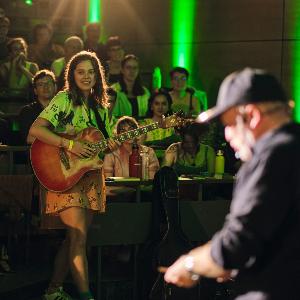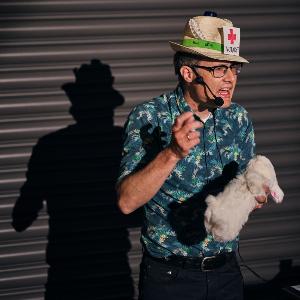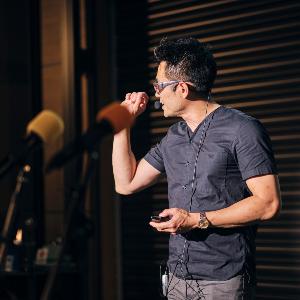Science Slam: “Science helps you understand the world”
7 Jul 2025
Five minutes to capture the audience’s imagination: At the Munich University Society’s Science Slam, researchers scratch where the audience itches.
7 Jul 2025
Five minutes to capture the audience’s imagination: At the Munich University Society’s Science Slam, researchers scratch where the audience itches.

Jasmine Frijters has brought her guitar and a song about Schrödinger's cat. | © LMU / LC Productions
It is not all that common for the noise level in a university auditorium to rival a jackhammer. Nor is the probability of seeing serious academics resuscitate toy rabbits, sing while wearing cat-themed blouses or mix fruit jelly strings in cooking pots particularly high. Yet all this and more can be witnessed on this Thursday evening at the end of July. Why? Because the Munich University Society (MUG) has opened the doors of the lecture theater at the Walther Straub Institute for the fourth MUG Science Slam.
It is just before seven in the evening. Outside, the last few drops of rain signal the end of a summer shower. Inside, Jasmine Frijters’ pen is drumming to the beat pulsing through her earphones. The quantum science student sings the lyrics softly to herself. In a few minutes, she will be on stage, guitar in hand, performing her song. The title? Schrödinger’s Cat. The concept? “It’s very simple,” the Dutch native says – and breaks into song: “Is there a cat? I’m not sure yet, maybe he’s dead.” It is one of two songs that deal with the famous thought experiment in physics tonight. “Science can help you understand the world,” Frijters says, “and music helps you tell the story.”

Berend Feddersens freestyle performance uses white rabbits and Rubiks cubes. | © LMU / LC Productions
Frijters is one of eleven participants in this year’s Science Slam. Students, postdoc researchers, professors, whoever, they each have five minutes’ time to talk about science and the world in one of three distinct categories: TED Talk, Freestyle or Poetry Slam. The volume of noise from the audience – measured by MUG president Peter Höppe with a decibel device after each category – determines the winner.
And it gets exceptionally loud after one Freestyle performance entitled “On good care: Advance care planning” by Professor Berend Feddersen, an outpatient palliative doctor at Munich University Hospital. For him, the device hits 118.11 decibels – comparable to a jackhammer at close quarters. Feddersen concocts rhymes for information about patient decrees, healthcare powers of attorney and the like, combines them with impressive tricks on a Rubik’s cube and even resuscitates a toy rabbit into the bargain.

Kevin Heng inspires with his TED Talk about exoplanets. | © LMU / LC Productions
The bunny, Feddersen later tells us, is a magician’s prop from the ’seventies, produced back then by a firm in Las Vegas, but now reworked and so deceptively authentic that his parents-in-law thought he was bringing a new pet home with him. Feddersen has been doing magic tricks for many years. He could juggle at the age of 14. And at some point, he hit on the idea that science and magic go well together and ought to be connected. “That makes it a lot more fun for people, and it is easier to explain the science,” he says.
“That’s why I love the Science Slams.” Any topics covered by science can and should be addressed at this kind of event. Accordingly, this particular evening delivers TED Talks about exoplanets (Kevin Heng, Professor at the Faculty of Physics) and neuroplasticity (Prateek Boga, student of astrophysics); songs about Schrödinger’s cat (“Alice in Quantum Land”, performed by physics student Sofie Silbermann and Veit Ziegelmaier of the Max Planck Institute of Quantum Optics); historical analysis of a soup that links ancient Sparta to Hitler and the north German state of Schleswig-Holstein (Dr. Denise Reitzenstein); and Poetry Slam entries about atmospheric monster worlds (Robert Reichert, postdoc physics researcher) and true murder cases in Munich’s gay scene (Rudolf Kindtner, student of law). “What you see on stage here is pretty far out,” muses moderator Vincent Courtens. After every “number”, Courtens takes the stage, introduces the next performance, cracks a joke or two and gets the audience fired up.
Said audience appears especially enthralled by a certain snail: In the Poetry Slam category, physics student Zsófia Meggyesi presents “The afflictions of a young doctoral candidate” who, in desperation, sends three rhyming letters to the research committee at LMU’s Faculty of Biology in a request for funding. The candidate’s research topic? Snails (“Pesticides and lawn mowers: The death of the snail is coming ever closer”). Meggyesi’s presentation of the letters is singularly witty and eloquent. She drops her notes, pulls more from her socks and delivers a show that is interrupted by applause and ultimately wins her second place.
Alas, it is all to no avail for the poor doctoral candidate: The research committee remains obdurate, prompting one final letter ends with an announcement that he is switching to another line of work: “There are other pretty places in the world: You can live a good life o’er in France, so behind the bar I’ll take my stance. Fine cuisine delights one and all, so my studies were useful after all.”
Meggyesi herself is studying the origins of life on Earth at LMU. Last year, she recounted the story of creation from the perspective of a single RNA molecule. “This year, I tried to find the funniest research topic,” she smiles, before admitting that she has always been very fond of snails. She delivered presentations about the mollusks way back in her school days. One of her favorite fun facts? “Snails can slither across the sharp edge of a knife without difficulty” – thanks to their slime trail.
Physics student Carolina Krotsch came first in the TED Talk category, having already won top slot in the Poetry Slam category in last year’s Science Slam. This year, she talks about the low proportion of women studying science, technology, engineering and mathematics (STEM in English; MINT in German, hence her title: “Mission MINTpossible”). “When I look around my lecture theater, I might see perhaps ten women. We can’t have that! With my lecture, I want to encourage more women to follow suit,” Krotsch tells us later.
Her evening presentation also includes solutions: Students should attend more lectures by female academics. Parents should tell their daughters about role models and about female colleagues who work in information technology – about Marie Curie, the first woman to win the Nobel Prizes for Physics and Chemistry. And universities should fast-track the appointment of more female professors.
The Science Slam is the perfect setting in which to address such issues, Krotsch goes on, because it brings everyone together: students, but also financial sponsors such as the Sparkasse (savings bank association – whose representative did a rap performance before handing over the prizes, incidentally!) and organizations such as the Munich University Society. Science, Krotsch notes, is not the exclusive preserve of men. Nor is it a women’s issue: “Science is something we should do together.”
TED TALK:
1.Carolina Krotsch 2. Kevin Heng 3. Prateek Boga
FREESTYLE:
1. Berend Feddersen 2. Denise Reitzenstein 3. Jasmine Frijters
POETRY-SLAM:
1. Valentina Braekler 2. Zsófia Meggyesi 3. Rudolf Kindtner